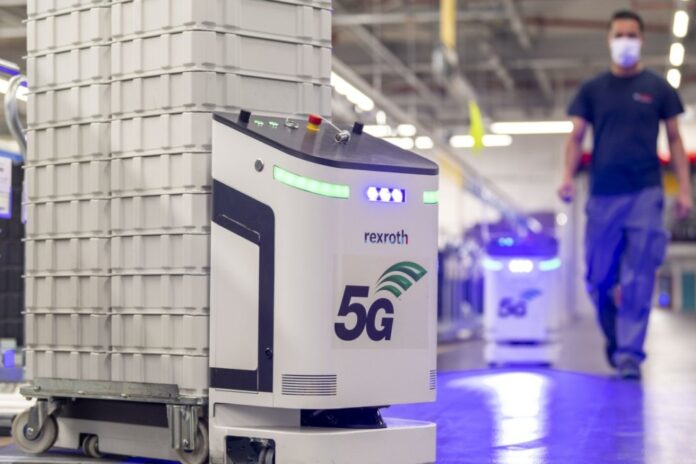The manufacturer’s first private 5G at the Stuttgart-Feuerbach plant in Germany is going live as it continues 5G research to further Industry 4.0.
Bosch has been one of the most vocal and active proponents of private 5G networks to drive Industry 4.0 forward, and the unofficial test case for Germany’s controversial policy of setting aside 5G spectrum for industry’s use.
It began its own research into 5G in 2014 and contributed to the standard, and continues to shape its development.
Bosch says that at its Industry 4.0 lead plant in Stuttgart-Feuerbach, the company will manufacture under previously unheard-of conditions, with data being transferred extremely reliably and ultra-fast, and machines reacting almost instantaneously.
Without exception
The company says that for the first time, wireless implementation will be possible for critical applications that require absolute precision and safety: according to Bosch, “iWthout exception, people and machines will be able to cooperate safely and without barriers”.
“5G strengthens our competitiveness and lets us make even more of Industry 4.0’s potential,” says Dr. Michael Bolle, Member of the Management Board and CDO/CTO at Bosch. “We will gradually roll 5G out to our roughly 250 plants around the world.”
In the coming months Bosch will be setting up 5G networks at its research campus in Renningen, Germany, and it is developing “5G-capable products” and launching its first solutions for industrial use.
“Campus networks are an important building block for Industry 4.0,” Bolle says, with their distinctive feature of ubiquitous and uninterrupted network coverage. The network can be optimised and tailored to precise industrial applications.”
Feuerbach first
In the campus network in Feuerbach, coverage is provided by eight small cells that ensure good reception throughout the facility, which covers around 10,000 square metres. Wirelessly connected machines and systems communicate with each other in real time and exchange data within milliseconds.
The 5G campus network is integrated into the IT infrastructure and continuously monitored, to offer maximum of security and independence. “Campus networks give us control – over what happens in the factory and over how data is transferred both within and beyond the factory walls,” Bolle says.
Bosch defined use cases, Nokia provided 5G components. The two companies are jointly responsible for network planning, operation, and servicing. The pioneering work in Feuerbach combines the principles of Industry 4.0 with 5G, optimised by AI.
As part of KICK, a project funded by the German Federal Ministry of Education and Research, Nokia and other partners are researching how AI can simplify operation and maintenance of 5G campus networks.
“We have a clear vision of the factory of the future, and how we need to develop our products to meet its requirements. In this context, 5G is a ‘springboard innovation,’ a technology that will fundamentally change the market,” said Rolf Najork, member of the Bosch board of management.
Launching 5G-capable products
Capgemini found that 65% of industrial companies worldwide plan to deploy 5G within the first two years of availability, and Bosch is developing solutions to meet this demand.
One example, its ActiveShuttle whose 5G capability and intelligent software allow it to integrate into logistics operations smoothly and safely.
5G also plays an important role in control technology.
Bosch Rexroth’s ctrlX Automation platform was designed for 5G from the outset. “We are forging new paths and bridging the gap between control systems, IT, and the internet of things.
“Our new control technology will use the new mobile communications standard to connect a wide range of devices,” Najork says.
5G boost for business
5G is also making inroads into healthcare, agriculture, mobility, and urban development.
Experts estimate that there will be up to 70 billion connected devices worldwide by 2025, ranging from industrial robots and autonomous cars to sensors that provide information about the nutrient content or moisture level of arable soils.
The new mobile communications standard plays a major role in this and is becoming a competitive factor. “We have played an active part in shaping 5G. Bosch started its research into 5G as early as 2014,” Bolle says.
These include activities such as 5G NetMobil, a project that shows how to achieve fully connected driving and how modern communications technology can make it safer.
Meanwhile, the international 5G-SMART association is investigating the potential effects 5G will have on complex semiconductor production.
These findings are being incorporated into the planning of 5G networks, also in Bosch’s new wafer fab in Dresden, which will be ready for 5G from day one.
Bosch now chairs the 5G-ACIA initiative, whose more than 70 member companies aim to shape 5G so that it meets the needs of manufacturing industry from the outset. As anIoT company that offers solutions for connected mobility, the smart home, and connected industry, Bosch sees 5G as a driver of future business.


